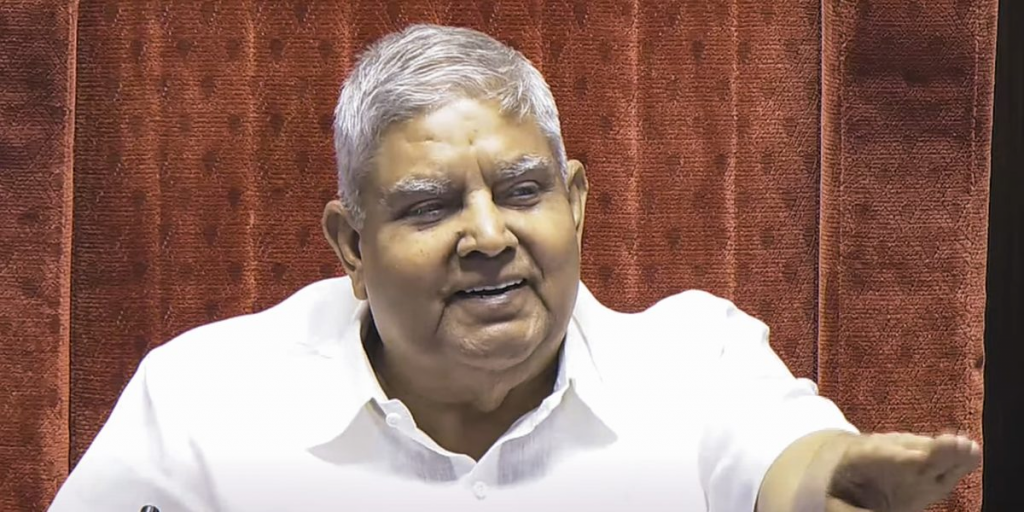
Vice President Jagdeep Dhankhar has strongly criticized the Supreme Court, especially its use of Article 142, calling it a “nuclear missile against democratic forces.” Speaking to Rajya Sabha interns on April 17, Dhankhar said the judiciary is overstepping its boundaries and behaving like a “super parliament” without accountability.
His comments came days after the Supreme Court ruled that governors cannot delay or stall bills passed by state legislatures indefinitely. In a landmark verdict, the Court also set deadlines for governors and the President to act on such bills, emphasizing that elected state governments cannot be held hostage by governors’ inaction.
Dhankhar Challenges Judiciary’s Authority Over President
The Vice President took issue with the court’s directive to the President of India, arguing that the judiciary does not have the authority to issue orders to the President under the Constitution.
“We cannot have a situation where you direct the President of India,” he said. “Judges are interpreting the Constitution under Article 145(3), but even that has specific conditions.” Dhankhar criticized how a small group of judges can interpret such major issues, arguing that the original intent required a proper majority—such as 5 out of 8 judges, not 5 out of 30.
He was particularly scathing about Article 142, which allows the Supreme Court to pass any order necessary for complete justice. “Article 142 has become a nuclear missile against democratic forces, available to judiciary 24×7,” he said.
SC Ruling on Tamil Nadu Bills
Earlier this month, the Supreme Court ruled that Tamil Nadu Governor R.N. Ravi’s refusal to act on multiple bills passed by the DMK government was unconstitutional. The bench of Justices J.B. Pardiwala and R. Mahadevan said governors must act within three months when a bill is sent to the President and one month when the bill is on their table. The court also ruled that the President does not have a “pocket veto” under Article 201, dismissing the indefinite delay in withholding assent.
This ruling came amidst growing concerns over governors in several opposition-ruled states delaying or blocking state legislature bills.
The Ministry of Home Affairs is reportedly preparing a review petition against the verdict, although the central government hasn’t officially responded yet.
Past Criticism and NJAC Reference
Dhankhar’s sharp tone follows his earlier criticism during the recent Budget Session, where he raised concerns about the judiciary following the alleged discovery of large sums of cash in a room damaged by fire at Delhi High Court Justice Yashwant Varma’s residence. He questioned why no action had been taken for over a month.
He also repeated his stance on the National Judicial Appointments Commission (NJAC) Act, which was declared unconstitutional by the Supreme Court in 2015. Dhankhar maintains that there is no provision for judicial review of constitutional amendments, calling the NJAC a “historic development.”
Remarks Amid Waqf Board Case
His latest remarks also come as the Supreme Court hears petitions challenging the Waqf (Amendment) Act, 2025. Critics argue that the Act bars non-Muslims from being part of Waqf Boards and the Central Waqf Council. The top court has given the Union government a week to respond to the request for a stay on the amended provisions.
During the hearing, Solicitor General Tushar Mehta suggested that objections to the religious composition of the Waqf Board might imply judges should also be chosen by religion. Chief Justice Sanjiv Khanna firmly rejected the comparison, emphasizing that judges operate in a secular capacity.
A History of Tensions
As West Bengal Governor before becoming Vice President, Dhankhar frequently clashed with the Mamata Banerjee-led government, earning him a reputation for political confrontation. The Trinamool Congress often called him the “real opposition leader” in the state.
Now in his constitutional role as Vice President, Dhankhar continues to challenge the judiciary, raising concerns about the separation of powers and calling for more transparency and accountability in the judicial system.